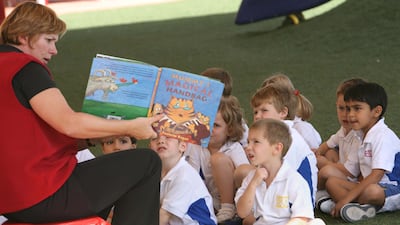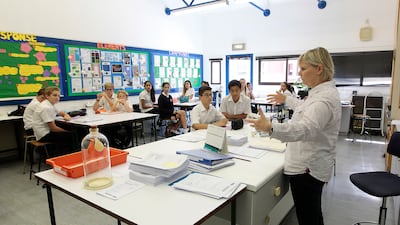At least four non-profit schools in Dubai will increase fees by between 5 per cent and 8 per cent in the new academic year, starting at the end of August.
Non-profit schools in the city are allowed to increase fees after seeking approvals, although for-profit schools have had fees frozen for three years.
Only a handful of schools in the country are not-for-profit, meaning that they are governed by an independent board and reinvest any profits they earn into the school.
Reducing disparity between primary and secondary
Fees at Dubai English Speaking School, one of the city's oldest schools, will be increased by 8 per cent, while tuition will go up by 5.5 per cent at Dubai English Speaking College.
For the 2022-23 academic year, fees at DESS will range from Dh38,305 in the foundation stage to Dh47,406 in years one to six. Those at DESC will range from Dh73,708 in years seven to 11 to Dh79,222 in the sixth form.
Dubai College has increased fees for years seven to 11 from Dh27,494 per term in 2021 to Dh28,869 per term in the new academic year starting in August.
Fees for years 12 and 13 have been increased from Dh31,333 every term in 2021 to Dh32,690 per term in the 2022-23 academic year. There are three terms in a school year.
In August, Jumeirah English Speaking School will raise its primary school fees by 5 per cent but fees at the secondary school will not be changed.
In a letter seen by The National, the school informed parents that “the rationale behind this fee increase is to ensure a financial model that enables JESS to keep developing and improving to deliver the standard of education expected from a leading not-for-profit school”.
The school said it also aimed to reduce the disparity between fees in the primary and secondary sections.
“Alongside increased operating costs since our fees were last visited in 2019 and the challenges of Covid, we have also made significant investments in staffing this year and the next, including increasing the number of social and emotional counsellors and increasing the number of learning support assistants in the primary schools,” it said.
Fees at the school started at Dh39,837 for Foundation 1 grade.
For-profit school fees still frozen
Dubai's private schools regulator, the Knowledge and Human Development Authority, put a freeze on tuition fees at for-profit schools in the city for three consecutive years, up to and including 2022-23.
In March, the KHDA announced fees at for-profit private schools in Dubai would not be increased for the coming academic year to reduce the financial burden on parents.
Fee increases proposed by non-profit schools are approved by the KHDA after the school board signs them off and evidence of parent endorsements is submitted.
Fiona McKenzie, head of Carfax Education UAE, said not-for-profit schools have more autonomy in setting their fees than their for-profit counterparts.
“Non-profit schools are set up quite differently from for-profit schools — they're much older, they were quite often set up by kind of a royal charter and maybe had been gifted the land (the school was built on),” said Ms McKenzie.
“They were given kind of an assurance of independence when they were set up. So therefore, they don't fall under the kind of fee restrictions that the for-profit schools do.
“Not-for-profit schools can increase their fees when they feel that they need to, whereas the for-profit schools come under KHDA regulations.”
Not-for-profit schools function under a different business model. While for-profit schools have the option to take some of profits as a return on their investment, with not-for-profits the money all has to go back into the school.
“And that means they pay the teachers slightly better, all the accommodation allowances are better, which is great, because it means you attract really good quality staff,” said Ms McKenzie.
She said some schools invested in facilities, or in teaching and learning, and had autonomy to do that.
Ms McKenzie said all schools reinvest money, it just depends how much.
“For a good school to be competitive in the market, it's got to have good teaching staff, it's got to have good facilities, it's got to be a good school. And that doesn't happen if you don't reinvest that kind of money into the school,” she said.







